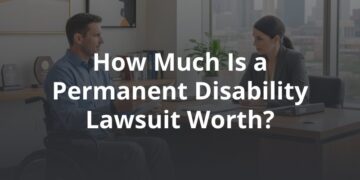Being injured can have devastating consequences and wreak havoc on your life. Adding insult to injury is when your actual injury is someone else’s fault. Fortunately, our civil legal system allows victims of personal injuries to recover for their damages, which can sometimes be quite significant.
What Constitutes a Personal Injury Case?
Personal injury means damage to a person’s body, mind, or reputation. The field of personal injury encompasses many different types of cases. Some examples include:
- Motor vehicle accidents
- Premises liability cases, where the victim is injured on someone else’s property
- Malpractice cases, such as medical malpractice
- Work injuries
- Products liability cases
- Wrongful death
What Are Some Common Personal Injuries in Such Cases?
There are many different injuries that can occur in these types of cases. Some injuries require medical treatment, doctors’ visits, prescription medications, and even hospital stays. Some injuries can be life-long and affect more than just your health: for example, an accident can sideline you from your job for a while, or may even prevent you from ever doing that job again in the future.
Some injuries cause deeply rooted pain and suffering, and some cause the victim to have to quit doing work or other activities they had enjoyed in the past. In the most severe cases, some injuries may even lead to death. Consider the following real-life examples, applied to the examples of cases above:
- If a truck driver is negligent and causes an accident on the highway, the victim might suffer life-threatening spinal or brain injuries.
- If a victim slips and falls on a wet floor in a supermarket, they might suffer broken bones, abrasions, and long-lasting pain.
- If a doctor negligently treats a patient, the patient might suffer life-altering injuries, including ones that keep the victim from performing his or her job.
- If someone is injured at work, they might lose income for the foreseeable future.
- If a defective product causes a severe eye injury, the victim might lose their eyesight, causing significant life-altering injuries.
- If an accident results in the death of the victim through the fault of another, the victim’s surviving relatives or estate are experiencing a wrongful death.
What Makes a Good Personal Injury Case?
Because the facts of each case are different and unique, it is important to discuss with your attorney all of the facts of your case, whether or not they are favorable to your claim. A knowledgeable personal injury will work with you to use favorable facts to strengthen your case.
You can greatly assist your attorney by keeping diligent notes about the accident that has led to your injuries. Moreover, a good case is often built on good evidence: by keeping track of documents, photographs, witness statements, and other evidence, you can help your attorney prepare an effective case for court or settlement.
In each of the above examples, as in your own case, it is imperative to be able to prove damages. There are two different types of damages: economic, which are readily quantifiable, and non-economic, which are not so easily calculated.
Economic damages are out-of-pocket costs, such as medical and hospital bills, or lost wages. Non-economic damages include mental anguish, pain and suffering, loss of enjoyment of activities, and loss of future income, among others. These types of damages are sometimes difficult to calculate and rely on the jury to weigh many different factors when coming up with a dollar figure.
What’s the Process?
Generally, a personal injury case will involve some type of negligence claim, which means you will need to prove that the other party was at fault, causing your damages. You will need to prove that the other party owed you a duty of care to be safe, and breached that duty by acting negligently.
Although every case is different, there are some steps that are common in the process of recovering from your personal injuries. You will likely need to file a claim in the appropriate court, but you will also want to negotiate for a favorable settlement as an option.
Most personal injury matters are settled outside of court, making it important to engage an attorney who is well-versed in settlement negotiations.
How Can FVF Help?
Because every injury case is different, it helps to have a personal injury lawyer who is experienced in handling a variety of accidents. FVF’s mission is to educate you on your rights and options so you can make good decisions under difficult circumstances.
Through this mission, we have helped countless people put their lives back together, whether after a traffic accident, workplace injury, or another event.
Our personal injury lawyers have decades of experience in traffic accidents, work injuries, and other types of injuries, and we are confident we can guide you in the right direction no matter what type of injury you sustain.
Contact us today to schedule a free, remote consultation with an Austin personal injury lawyer.








